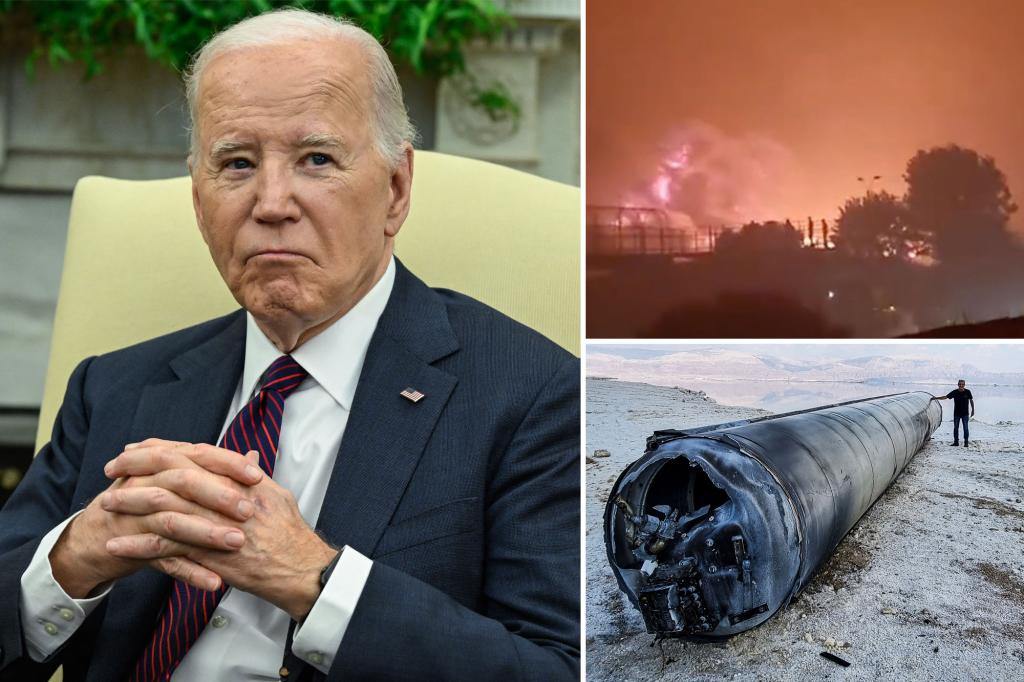The White House announced that President Biden would impose new sanctions on Iran’s missile and drone programs following an attack on Israel. National Security Adviser Jake Sullivan made a statement about the penalties, including targeting entities supporting the Islamic Revolutionary Guard Corps (IRGC) and Iran’s Defense Ministry. These measures are part of an effort to contain and degrade Iran’s military capacity and problematic behaviors, with over 600 individuals and entities already sanctioned for connections to terrorism, human rights abuses, and support for terrorist groups.
Critics have accused Biden of easing up on former President Trump’s “maximum pressure campaign” against Iran. Israeli officials reported that no one was killed in Iran’s recent missile and drone attack on Israel, but a 7-year-old girl was seriously injured. The attack was in retaliation for an Israeli airstrike on Iran’s consulate in Damascus. The American and Israeli militaries were able to intercept most of the Iranian explosives before they reached their targets. Biden is not expected to target Iran’s oil exports in these new sanctions, despite some concerns from Congress.
In September, Biden agreed to release $6 billion in frozen Iranian oil proceeds to Qatar for Iran to purchase food and medicine in exchange for the release of five Iranian-American inmates. However, a “quiet agreement” was reached in October to pause the distribution of funds, and it is unclear what the current status of the money is. In November, the US issued a sanctions waiver allowing Iraq to pay Iran for electricity, potentially giving Iran access to $10 billion. A bipartisan group in Congress has urged Biden to enforce sanctions on Iranian oil sales, especially to China, which have significantly increased since he took office.
The announcement of new sanctions comes amid bipartisan pressure to take action against Iran and strengthen existing sanctions. Critics in Congress have voiced concerns about Biden’s approach to Iran, accusing him of easing up on the maximum pressure campaign initiated by Trump. Israeli officials stated that while no deaths occurred in Iran’s recent attack on Israel, a 7-year-old girl was seriously injured. The attack was in response to an Israeli airstrike on Iran’s consulate in Damascus, with most of the Iranian explosives being intercepted before reaching their targets.
Despite the new sanctions, it is reported that Biden is not targeting Iran’s oil exports in this round of penalties. This decision has raised concerns among lawmakers, given the significant economic benefits Iran is receiving from oil exports, primarily to China. There have been previous agreements regarding frozen Iranian funds and waivers allowing Iran access to funds through transactions with other countries like Qatar and Iraq. A group of 62 House members, including Democrats Adam Schiff and Eric Swalwell, have called for stricter enforcement of sanctions on Iranian oil sales to prevent further economic benefits for Iran.
The bipartisan group in Congress has criticized the Biden administration for scaling back efforts to enforce sanctions on Iranian oil shipments, resulting in a significant increase in Iran’s economic growth and foreign currency reserves. They are urging the administration to reverse this policy and take stronger action against Iran’s illicit oil exports. The ongoing pressure on Iran through sanctions is part of a broader effort to contain the country’s military capabilities and problematic behaviors. The latest round of sanctions targeting Iran’s missile and drone programs is expected to continue this strategy.


